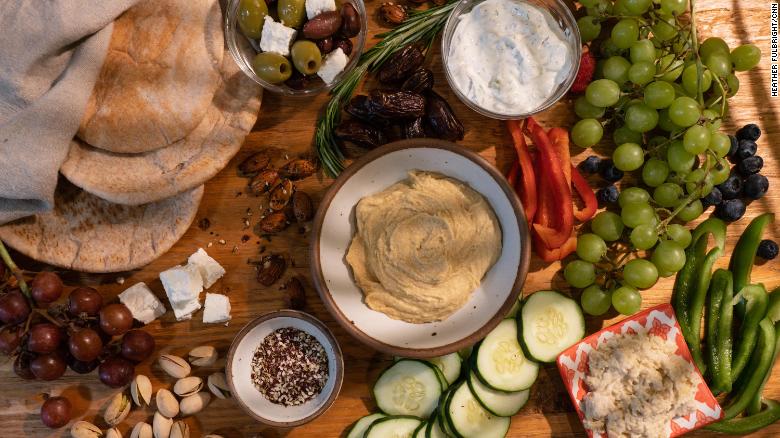How to Start the Mediterranean Diet — Meal by Meal

Considered one of the healthiest diets in the world, the Mediterranean way of eating cuts processed foods and red meats, focusing instead on fresh fruits and vegetables, nuts and seeds, healthy whole grains and extra-virgin olive oil.
Eating this way has been shown to reduce the risk for diabetes, high cholesterol, dementia, memory loss, depression and breast cancer and has been linked to stronger bones, a healthier heart and longer life. Oh, and don't forget weight loss!
The simplest way to start the Mediterranean style of eating is to replace one meal a day with a plant- or grain-based choice, experts say. We've made that easy for you by asking CNN contributor Rahaf Al Bochi, a registered dietitian nutritionist and founder of Olive Tree Nutrition, to create these Mediterranean-inspired recipes for each meal of the day, along with snacks and dessert.
We've even added a recipe sure to entice your kids to eat the healthy Mediterranean way, a brunch suggestion, and tips on how to prep in advance and cook and freeze. Enjoy!
Breakfast
Breakfast is an easy way to start the Mediterranean style of eating. You can enjoy a warm and filling ancient grain, topped with yogurt, fruit and honey. Alternatively, pare down and simply go with Greek yogurt, which has double the protein and half the sugar for the same calories as regular yogurt, topped with fresh fruit, berries and a sprinkle of nuts.
To take your yogurt breakfast to another level, try this version. It's a unique combination of whipped Greek yogurt with cardamom, vanilla, medjool dates and pistachios.
Lunch
Lunch is another great meal to replace with a Mediterranean option. Eating a grain- or legume-based salad, for example, helps raise blood sugar slowly, giving your brain the energy it needs to make it through the day. It also reduces overeating at night.
This gorgeous farro salad is chock-full of veggies, sprinkled with Greek feta and drizzled with vinaigrette.
Snacks
Studies have shown that few of us eat enough nuts, a great source of heart-healthy polyunsaturated and monounsaturated fats. Packed with protein, nuts are a super choice for a snack, as long as you watch your portions -- they can be calorie-dense. This almond snack features the Mediterranean spice blend za'atar.
Za'atar varies by culture, but it is generally a combo of toasted sesame seeds, dried oregano, and thyme or marjoram, along with the the tart, tangy Mediterranean spice sumac.
Dinner
The use of red and processed meats is rare in the traditional Mediterranean diet, but fish and other seafood (which are good for your brain) are consumed at least twice a week. For your dining pleasure, try this recipe of salmon with roasted grape salsa, a colorful mix of roasted red grapes, red peppers, green peppers, red onions, lemon juice and cilantro.
Dessert
You might think you'll chow down on such Mediterranean delights as baklava, tiramisu, cannoli, gelato, flan and crème brûlée, but those are saved as occasional special treats in many of the countries around the Mediterranean Sea.
Instead, think fresh fruit, whole, sliced or grilled, or a healthy combo of whole-grain granola with ricotta and freshly grated orange zest.
Brunch
In the Mediterranean, a massive platter of meze is typically served as an appetizer, but you can repurpose this visually striking spread as a festive brunch. Assemble small bowls of hummus and baba ghanoush -- or roasted eggplant dip -- along with fresh figs and dried dates, raw vegetables, yogurt dip, cheeses, and warm slices of pita.
Roasted or stuffed veggies are another brunch choice, along with casseroles. Originating in North Africa, a breakfast staple adopted by Middle Eastern countries such as Israel and Palestine that can feed a crowd is shakshuka. This one-skillet dish is typically a blend of tomatoes, red peppers, onions, garlic and spices with eggs poached on top.
It can be made with various veggies, and Al Bochi's green version takes a spin on the regional favorite by using spinach with fresh basil.
Prep ahead and freeze
If cooking on the weekends and freezing for the weeks ahead is your thing -- or you'd like ideas for how to start -- you're in luck. Many Mediterranean foods can be prepped or frozen with no issues. Whole grains can be made in bulk in a slow cooker and frozen in individual servings for breakfast or added to soups and salads built later.
This make-ahead, freezable breakfast -- packed with vegetables and a bit of feta -- is a breeze to prepare in advance for busy mornings or a midday protein snack.
Kid-friendly meals
Concerned the litte ones won't take to the Mediterranean style of eating? No worries -- try these fun and healthy pita pizzas. Slice the black olives into round eyes and curve the roasted red pepper strips into a smile -- the spinach makes great hair!
The post How to start the Mediterranean diet — meal by meal appeared first on CNN Health.









